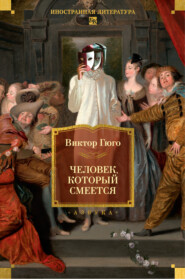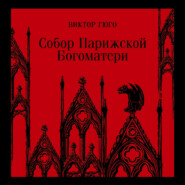По всем вопросам обращайтесь на: info@litportal.ru
(©) 2003-2024.
✖
Собор Парижской богоматери / Notre-Dame de Paris
Настройки чтения
Размер шрифта
Высота строк
Поля
Book Second
Chapter I
From Charybdis to Scylla
Night comes on early in January. The streets were already dark when Gringoire left the Courts. This gloom pleased him. After the brilliant failure of his first theatrical venture, he dared not return to the place he lived in, as he owned twelve sols for the rent. He remembered to seeing in the Rue de la Savaterie, at the door of a councillor of the parliament, a stepping stone for mounting a mule, which could serve as a very excellent pillow for a mendicant or a poet. He thanked Providence for having sent this happy idea to him; but then he saw the procession of the Pope of the Fools, which was also emerging from the court house. He fled.
Children were running about here and there with fire lances and rockets.
A street opened before him; he thought it so dark and deserted that he hoped to escape from all the rumors as well as from all the gleams of the festival. He reached the western point of the city and considered for some time the islet of the Passeur-aux-Vaches. The islet appeared to him in the shadow like a black mass. One could see by the ray of a tiny light a hut in the form of a beehive where the ferryman of cows took refuge at night.
“Happy ferryman!” thought Gringoire; “you do not dream of glory, and you do not make marriage songs! What matters it to you, if kings and Duchesses of Burgundy marry? Thanks, ferryman, your cabin rests my eyes, and makes me forget Paris!”
He was roused from his thoughts by the sounds of the cow ferryman taking his part in the rejoicings of the day and letting off fireworks.
“Accursed festival!” exclaimed Gringoire, “will it pursue me everywhere?”
Then he looked at the Seine at his feet, and a horrible temptation took possession of him:
“Oh!” said he, “I would gladly drown myself, were the water not so cold!”
Chapter II
The Place de Gr?ve
Place de Gr?ve was bordered on one side by the quay, and on the other three by a series of narrow and gloomy houses. By day, one could admire the variety of its edifices, all sculptured in stone or wood, presenting complete specimens of the different domestic architectures of the Middle Ages, running back from the fifteenth to the eleventh century. At night, one could distinguish nothing of all that mass of buildings, except the black indentation of the roofs, unrolling their chain of acute angles round the place.
When Pierre Gringoire arrived on the Place de Gr?ve, he was paralyzed. He had directed his course across the Pont aux Meuniers, in order to avoid the crowd; but the wheels of all the bishop’s mills had splashed him as he passed, and he was drenched. Hence he went to draw near the bonfire, which was burning magnificently in the middle of the Place. But a considerable crowd formed a circle around it.
“Accursed Parisians!” he said to imself, “there they are obstructing my fire! Nevertheless, I am greatly in need of warmth. Move aside! I’d like to know what they are doing there!”
On looking more closely, he saw that the circle was much larger than was required simply for the purpose of getting warm.
In a vast space between the crowd and the fire, a young girl was dancing.
Gringoire was fascinated.
She was not tall. Her skin possessed a beautiful golden tone of the Andalusians and the Roman women. She danced, she turned, she whirled rapidly about on an old Persian rug, and each time her radiant face passed before you, as she whirled, her great black eyes darted a flash of lightning at you.
She was a supernatural creature.
“In truth,” said Gringoire to himself, “she is a nymph, she is a goddess!”
At that moment, one of girl’s braids of hair became unfastened, and a piece of yellow copper which was attached to it, rolled to the ground.
“No!” said he, “she is a gypsy!”
All illusions had disappeared.
Disenchanted though Gringoire was, the whole picture was not without its charm and its magic; the bonfire illuminated, with a red flaring light, which trembled, all alive, over the circle of faces in the crowd and on the young girl.
Among the thousands of faces which that light tinged with scarlet, there was one which seemed, even more than all the others, absorbed in contemplation of the dancer. It was the face of a man, calm, and sombre. This man, whose costume was concealed by the crowd, did not appear to be more than thirty five years of age; his broad, high forehead had begun to be furrowed with wrinkles, but his deep-set eyes sparkled with extraordinary youthfulness. He kept them fixed on the gypsy. From time to time, he would a smile and let out a sigh.
The young girl, stopped, breathless, and the people applauded her lovingly.
“Djali!” said the gypsy.
Then Gringoire saw a pretty little white goat come up to her.
“Djali!” said the dancer, “it is your turn.”
And, seating herself, she gracefully presented her tambourine to the goat.
“Djali,” she continued, “what month is this?”
The goat lifted its fore foot, and struck one blow upon the tambourine. It was the first month in the year, in fact.
“Djali,” pursued the young girl, turning her tambourine round, “what day of the month is this?”
Djali raised his little gilt hoof, and struck six blows on the tambourine.
The people were amazed.
“There’s sorcery at the bottom of it,” said a sinister voice in the crowd. It was that of the man, who never removed his eyes from the gypsy.
She continued to question her goat.
“Djali, what does Master Guichard Grand-Remy, captain of the pistoliers of the town do, at the procession of Candlemas?”
Djali reared himself on his hind legs, and began to bleat, marching along with so much dainty gravity, that the entire circle of spectators burst into a laugh at this parody of the interested devoutness of the captain of pistoliers.
The crowd applauded louder than ever.
“Sacrilege!” resumed the voice of the bald man.
The gypsy turned around.
“Ah!” said she, “’tis that villanous man!” Then she executed a pirouette on her heel, and set about[4 - set about – отправилась] collecting in her tambourine the gifts of the multitude.
Money showered into it.
All at once, she passed in front of Gringoire. Gringoire put his hand into his pocket to find it empty. The pretty girl stood there, waiting.
An unexpected incident came to his rescue.
“Will you take yourself off, you Egyptian grasshopper?” cried a sharp voice.
The young girl turned round. It was no longer the voice of the bald man; it was the voice of a woman.
Chapter I
From Charybdis to Scylla
Night comes on early in January. The streets were already dark when Gringoire left the Courts. This gloom pleased him. After the brilliant failure of his first theatrical venture, he dared not return to the place he lived in, as he owned twelve sols for the rent. He remembered to seeing in the Rue de la Savaterie, at the door of a councillor of the parliament, a stepping stone for mounting a mule, which could serve as a very excellent pillow for a mendicant or a poet. He thanked Providence for having sent this happy idea to him; but then he saw the procession of the Pope of the Fools, which was also emerging from the court house. He fled.
Children were running about here and there with fire lances and rockets.
A street opened before him; he thought it so dark and deserted that he hoped to escape from all the rumors as well as from all the gleams of the festival. He reached the western point of the city and considered for some time the islet of the Passeur-aux-Vaches. The islet appeared to him in the shadow like a black mass. One could see by the ray of a tiny light a hut in the form of a beehive where the ferryman of cows took refuge at night.
“Happy ferryman!” thought Gringoire; “you do not dream of glory, and you do not make marriage songs! What matters it to you, if kings and Duchesses of Burgundy marry? Thanks, ferryman, your cabin rests my eyes, and makes me forget Paris!”
He was roused from his thoughts by the sounds of the cow ferryman taking his part in the rejoicings of the day and letting off fireworks.
“Accursed festival!” exclaimed Gringoire, “will it pursue me everywhere?”
Then he looked at the Seine at his feet, and a horrible temptation took possession of him:
“Oh!” said he, “I would gladly drown myself, were the water not so cold!”
Chapter II
The Place de Gr?ve
Place de Gr?ve was bordered on one side by the quay, and on the other three by a series of narrow and gloomy houses. By day, one could admire the variety of its edifices, all sculptured in stone or wood, presenting complete specimens of the different domestic architectures of the Middle Ages, running back from the fifteenth to the eleventh century. At night, one could distinguish nothing of all that mass of buildings, except the black indentation of the roofs, unrolling their chain of acute angles round the place.
When Pierre Gringoire arrived on the Place de Gr?ve, he was paralyzed. He had directed his course across the Pont aux Meuniers, in order to avoid the crowd; but the wheels of all the bishop’s mills had splashed him as he passed, and he was drenched. Hence he went to draw near the bonfire, which was burning magnificently in the middle of the Place. But a considerable crowd formed a circle around it.
“Accursed Parisians!” he said to imself, “there they are obstructing my fire! Nevertheless, I am greatly in need of warmth. Move aside! I’d like to know what they are doing there!”
On looking more closely, he saw that the circle was much larger than was required simply for the purpose of getting warm.
In a vast space between the crowd and the fire, a young girl was dancing.
Gringoire was fascinated.
She was not tall. Her skin possessed a beautiful golden tone of the Andalusians and the Roman women. She danced, she turned, she whirled rapidly about on an old Persian rug, and each time her radiant face passed before you, as she whirled, her great black eyes darted a flash of lightning at you.
She was a supernatural creature.
“In truth,” said Gringoire to himself, “she is a nymph, she is a goddess!”
At that moment, one of girl’s braids of hair became unfastened, and a piece of yellow copper which was attached to it, rolled to the ground.
“No!” said he, “she is a gypsy!”
All illusions had disappeared.
Disenchanted though Gringoire was, the whole picture was not without its charm and its magic; the bonfire illuminated, with a red flaring light, which trembled, all alive, over the circle of faces in the crowd and on the young girl.
Among the thousands of faces which that light tinged with scarlet, there was one which seemed, even more than all the others, absorbed in contemplation of the dancer. It was the face of a man, calm, and sombre. This man, whose costume was concealed by the crowd, did not appear to be more than thirty five years of age; his broad, high forehead had begun to be furrowed with wrinkles, but his deep-set eyes sparkled with extraordinary youthfulness. He kept them fixed on the gypsy. From time to time, he would a smile and let out a sigh.
The young girl, stopped, breathless, and the people applauded her lovingly.
“Djali!” said the gypsy.
Then Gringoire saw a pretty little white goat come up to her.
“Djali!” said the dancer, “it is your turn.”
And, seating herself, she gracefully presented her tambourine to the goat.
“Djali,” she continued, “what month is this?”
The goat lifted its fore foot, and struck one blow upon the tambourine. It was the first month in the year, in fact.
“Djali,” pursued the young girl, turning her tambourine round, “what day of the month is this?”
Djali raised his little gilt hoof, and struck six blows on the tambourine.
The people were amazed.
“There’s sorcery at the bottom of it,” said a sinister voice in the crowd. It was that of the man, who never removed his eyes from the gypsy.
She continued to question her goat.
“Djali, what does Master Guichard Grand-Remy, captain of the pistoliers of the town do, at the procession of Candlemas?”
Djali reared himself on his hind legs, and began to bleat, marching along with so much dainty gravity, that the entire circle of spectators burst into a laugh at this parody of the interested devoutness of the captain of pistoliers.
The crowd applauded louder than ever.
“Sacrilege!” resumed the voice of the bald man.
The gypsy turned around.
“Ah!” said she, “’tis that villanous man!” Then she executed a pirouette on her heel, and set about[4 - set about – отправилась] collecting in her tambourine the gifts of the multitude.
Money showered into it.
All at once, she passed in front of Gringoire. Gringoire put his hand into his pocket to find it empty. The pretty girl stood there, waiting.
An unexpected incident came to his rescue.
“Will you take yourself off, you Egyptian grasshopper?” cried a sharp voice.
The young girl turned round. It was no longer the voice of the bald man; it was the voice of a woman.

















